
In the Midst of Grief – Practical Tools
Mourning Our Losses
Grief is no stranger to those of us affected by chronic illness, mental illness, pain, and suffering. While there are no rules for grieving chronic loss, there is a road map and there are fellow travelers ahead and behind us on the journey. Grief often precedes growth.
Now is your time of grief, but I will see you again and you will rejoice, and no one will take away your joy. (John 16:22)
PRACTICAL TOOLS FOR COPING WITH GRIEF
“People experiencing deep loss are navigating a new normal and developing a way to deal with grief’s profound questions, unexpected moments, and complicated scenarios,” write Whitney Akers and Sara Giusti. Here you will find some practical tools for coping with grief. We pray they will encourage you on your journey of grief.

14 WAYS TO MAKE A DIFFICULT DAY BRIGHTER
- Make time for tears – Tears are cleansing, but can sometimes feel as if they’ll swallow us whole. Setting a timer can create a protective boundary for overwhelming emotions.
- Tell your story – Expressing grief can be done through words — or we can paint, sculpt, sing, dance, bake, journal, knit, carve, craft, build, garden, or sketch. There are many ways to express grief.
- Permission to ask – It’s okay to ask for what we need, even if it’s asking others to please just listen, offer a hug, or steer clear of helpful clichés.
- Challenge yourself to move – All movement counts, including getting out of bed, folding the laundry, making dinner, dancing to a playlist, walking around the block or up and down stairs, stretching, or even taking a shower.
- Splurge on soft tissues – A little softness is comforting when we’re grieving.
- Cuddle up – A soft flannel, a favorite sweater, or a warm blanket can help us feel comforted and protected on a difficult day.
- Favorite foods – Stock the cupboards with healthy food that are quick and easy to prepare.
A FEW MORE
- Spend a little time outside – Fresh air offers a change of scenery and a new perspective, reminding us that God is still in control.
- Shower or take a bath – Feeling clean makes a difference, even if all we do is put on fresh pajamas and crawl right back into bed.
- Share a good laugh – Calling a friend or loved one who can make us laugh in the messy midst of grief is a precious gift.
- Nourish the mind – Keeping a list of books, podcasts, and TED Talks offers an easy distraction for grief-weary minds.
- Thank god for one good thing – Gratitude can be difficult to feel in the midst of grief, but there is always something to be thankful for: sunshine through a window, a phone call from a friend, a handwritten card, a warm sweater, a great cup of tea, or really good chocolate.
- Stay connected – Time with others on the phone or in person can make a big difference on hard days.
- Being good to ourselves – Treating ourselves to a beautiful hike, lunch with a friend, a great cup of coffee, or a new book might be a perfect pick-me-up on a difficult day.

FREE PRINTABLES
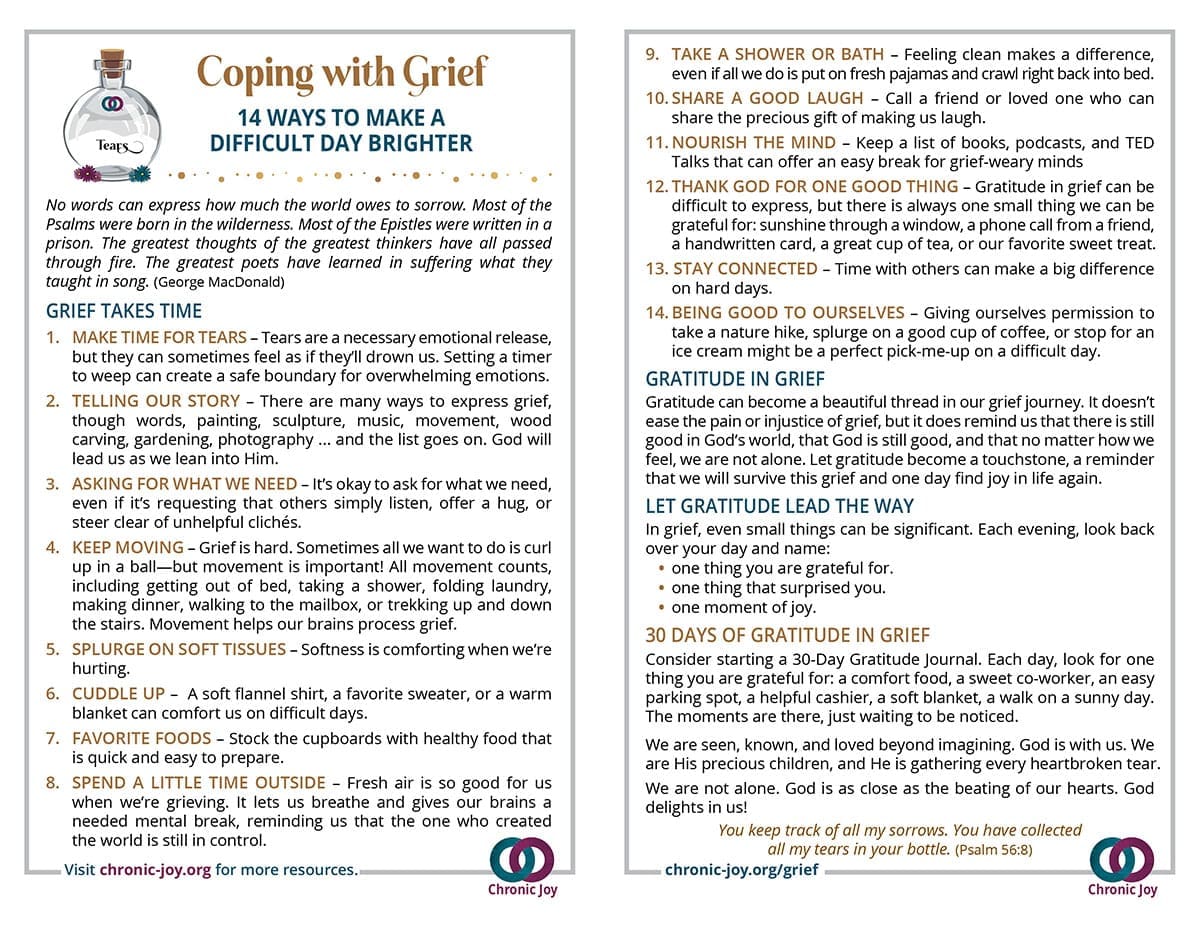
Coping with Grief
14 Ways to Make a Difficult Day Brighter • Grief is a journey requiring steady sips of hope, plates filled with God’s unbroken promises, the comfort of community, replenishing rest, and fresh air and sunshine.
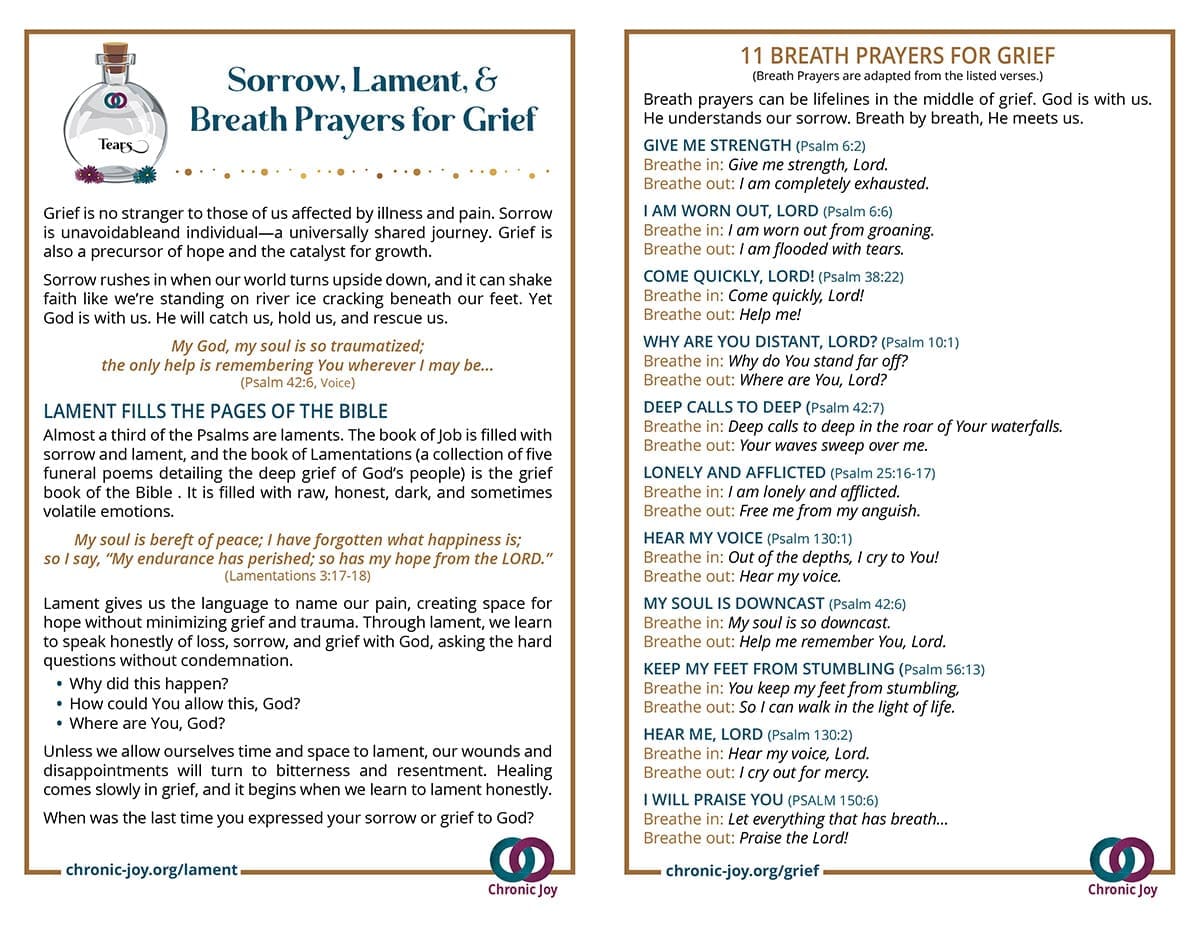
Sorrow, Lament & Grief
Grief is no stranger to those affected by chronic illness, mental illness, chronic pain, and disability. It is both a universally-shared human experience and uniquely individual.

In the Midst of Grief Note Starters
It’s hard to know what to say to someone who has suffered a loss. What matters is not the length of our message, but the simplicity of a few well-chosen words.

Verses & Prayers for Those in the Midst of Grief
God’s Word is a healing balm to a heart shattered by grief. You are seen, known, and loved beyond imagining by the One who laid down His life for yours. May He comfort, encourage, and strengthen you as you grieve.

THE EMOTIONS WHEEL
The Emotions Wheel is a tool designed to help us better identify and communicate our emotions instead of moving through our days without recognizing or thinking about what we’re feeling or why.
“In the years since getting sick and becoming disabled, I’ve learned that a whole range of emotions is just as much a part of my illness as my physical symptoms,” writes Angie Ebba.
Grief is complex and can make it difficult for us to identify what it is we’re feeling. “Sometimes just knowing the right emotion can bring a surprising amount of relief,” writes clinical psychologist, Kevin Gilliland. Identifying our emotions can help us communicate more effectively, verbalizing what we need and better-interpreting others’ feelings as well.
HOW TO USE THE EMOTIONS WHEEL
Begin at the center of the wheel and choose one of the six core emotions (angry, bad, disgust, fearful, happy, sad, or surprised). Follow that color out to the second tier and choose one of the more specific emotions there. Continue to the third tier and identify which of the 82 more nuanced emotions you are feeling.
We’ve designed our Emotions Wheels for adults, teens, tweens, and even a special wheel for children featuring both words and faces.
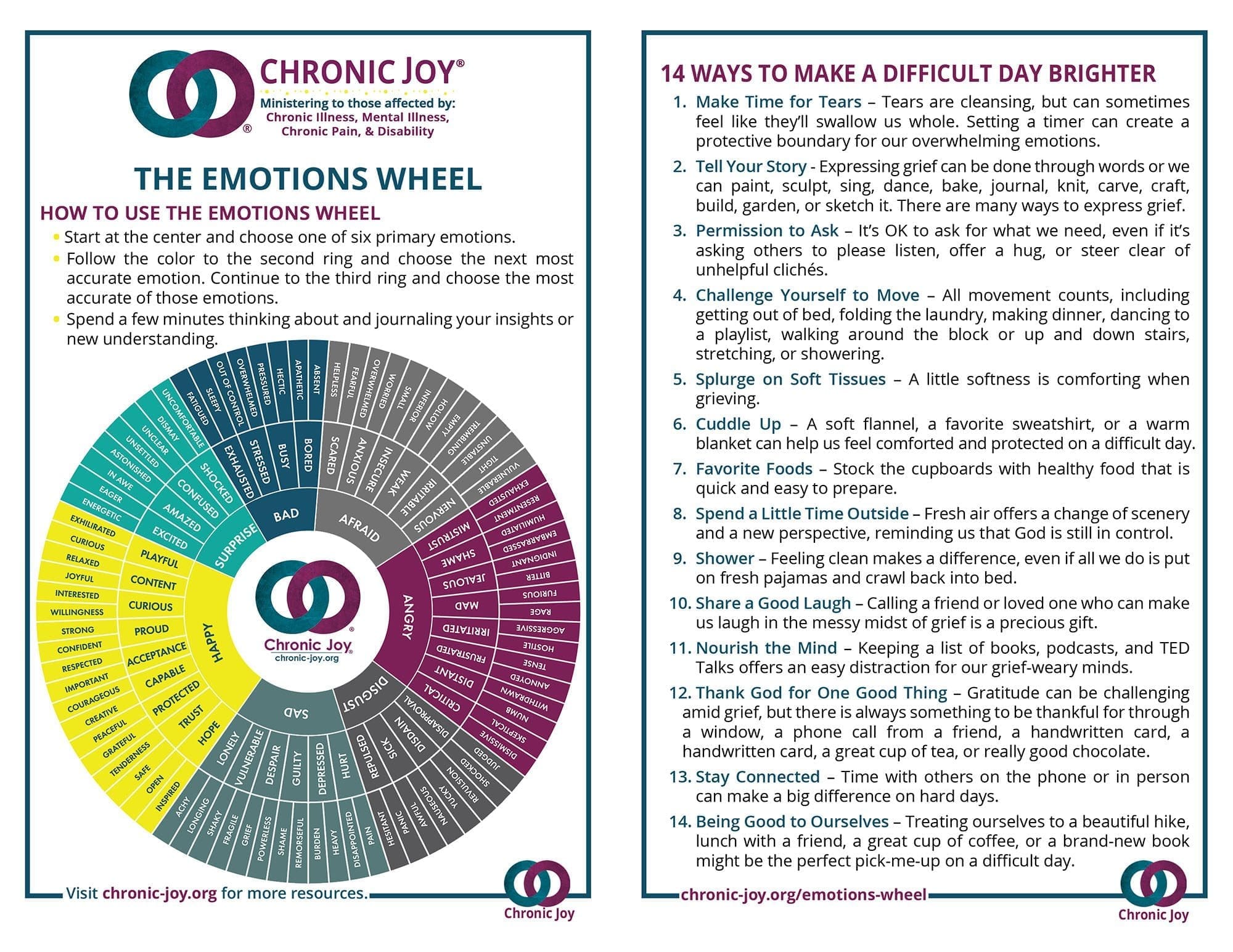
Emotions Wheel
God created us with a complex range of emotions which can be difficult to identify and explain. The Emotions Wheel is a tool designed to grow our emotional intelligence, thus strengthening our relationship with God as well as our compassion and empathy for others.
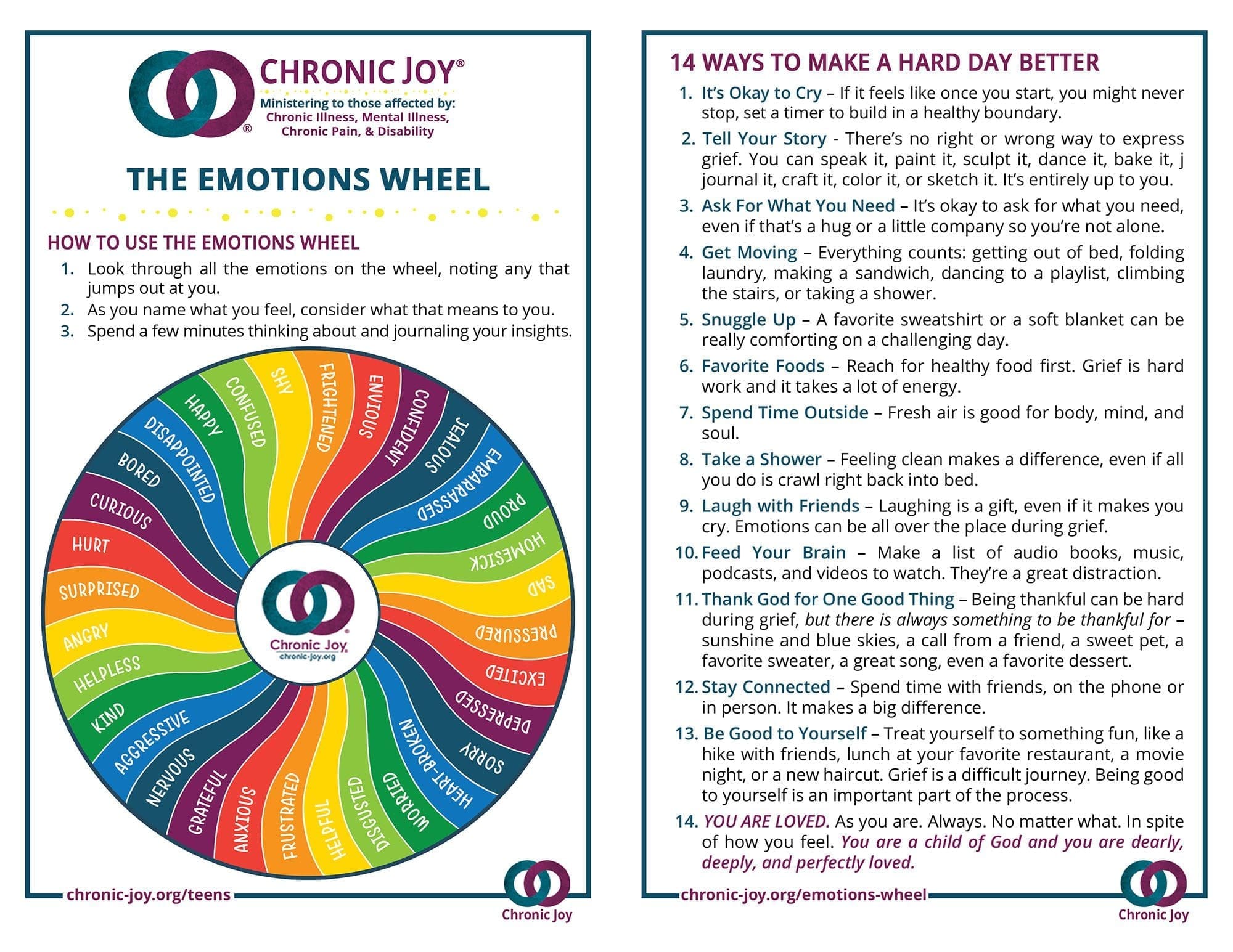
Emotions Wheel
God created us with a whole range of emotions, some of which can be difficult to feel and even riskier to talk about. Learning to identify our emotions helps us grow in our understanding of God and of others. The Emotions Wheel is a great place to begin!
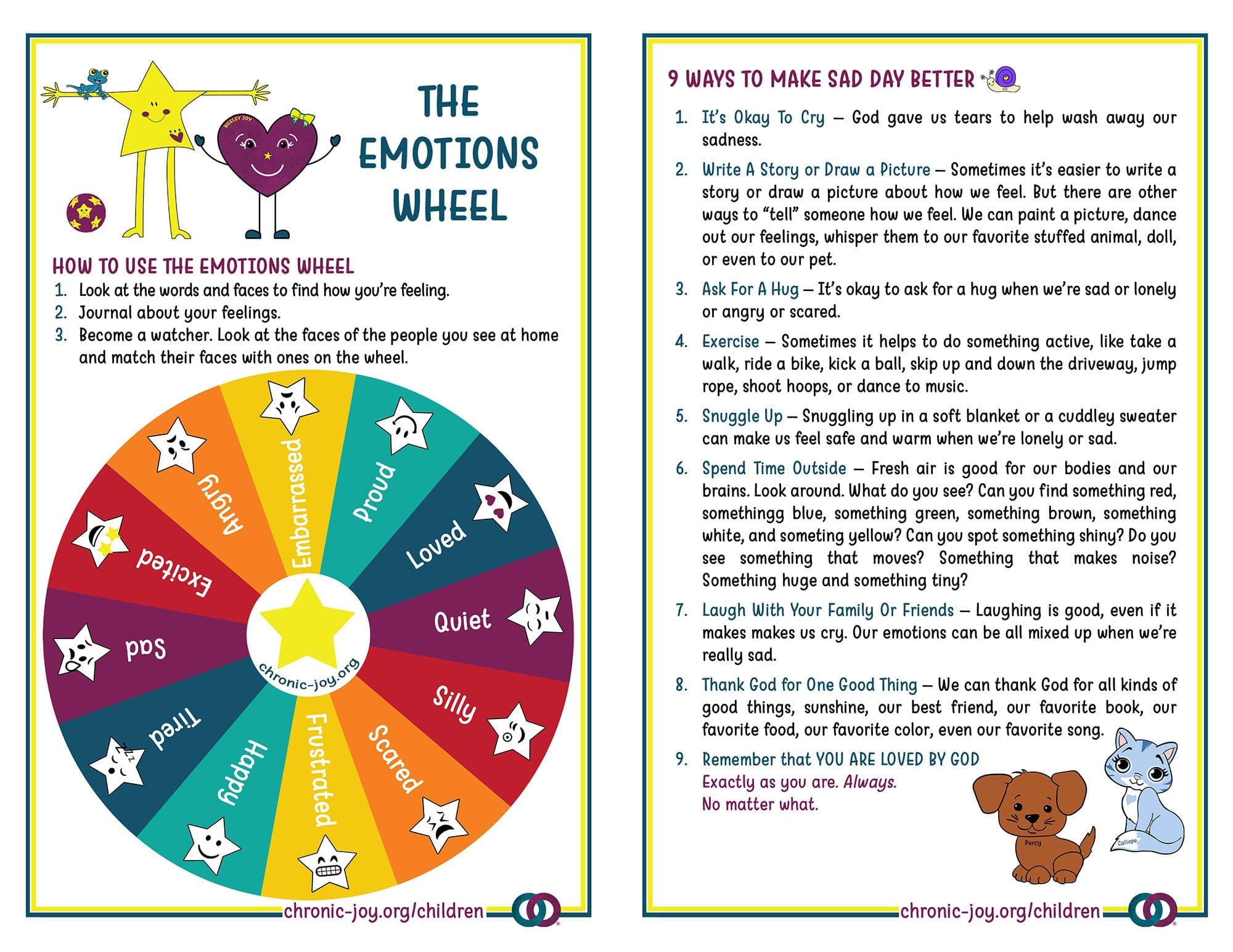
Emotions Wheel for Kids
The Emotions Wheel is designed to help children recognize and name the emotions they experience. As their emotional vocabulary grows, so does their ability to effectively communicate what and how they feel.
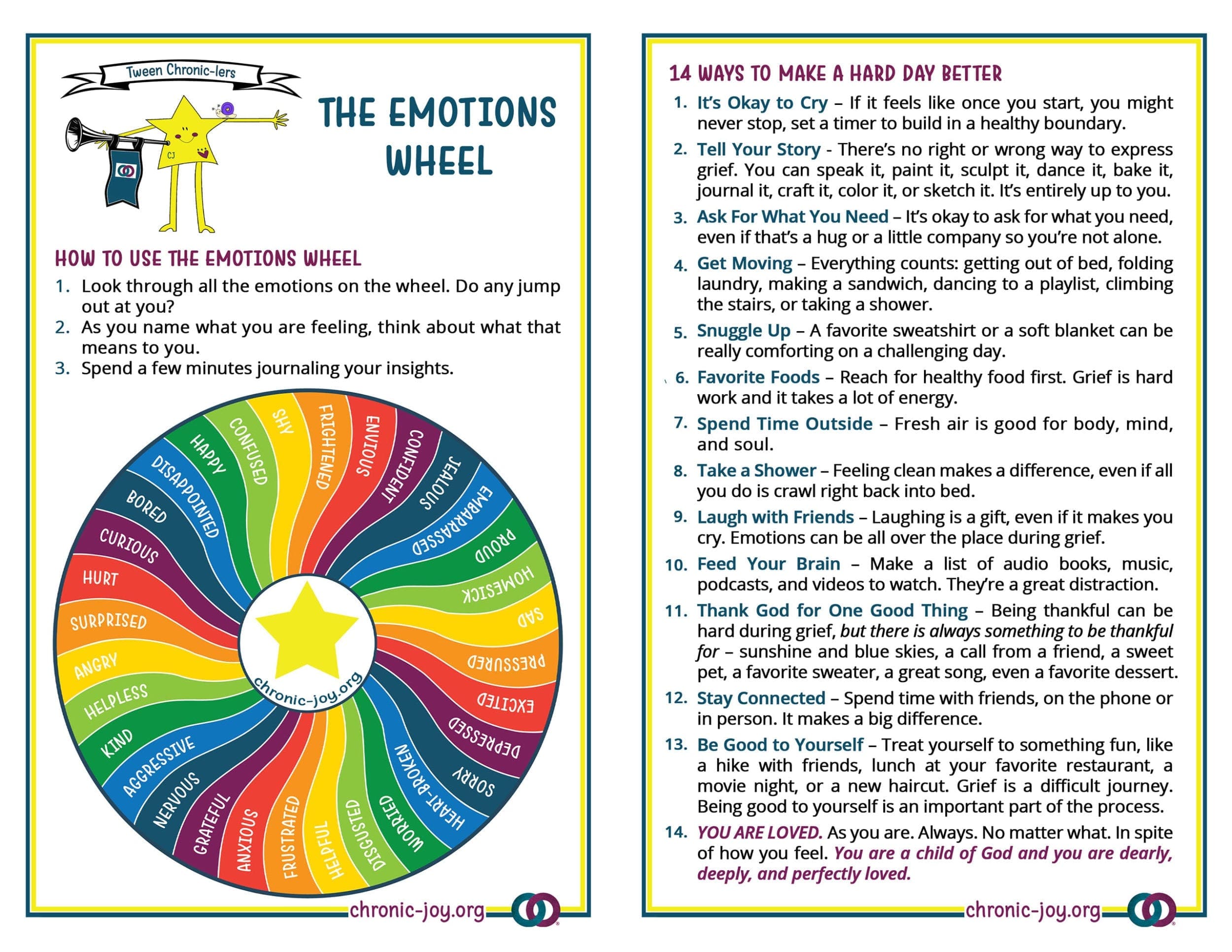
Emotions Wheel for Tweens
As tweens learn to identify and label their emotions, they not only grow in emotional intelligence but also take an important step in learning to identify the feelings of others, which forms the foundations of empathy and compassion.
GRIEVING WITH HOPE
God doesn’t condemn our grief and sadness. He knows they are a part of our human experience in this fallen world, but He gently reminds us that through His Son, we grieve with hope.
Grief is a journey requiring steady sips of hope, plates filled with God’s unbroken promises, the comfort of community, replenishing rest, fresh air and sunshine, and the unexpected surprise of a blue-winged butterfly.
In this world, we will experience pain, loss, separation, and death, but a better day is coming, a day when death and brokenness no longer have sway. That is our bright hope as we experience grief and sorrow on this long and winding journey Home.

